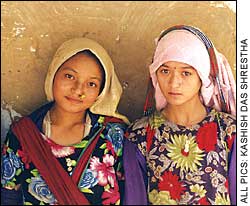 It just takes a few hours walk out of the Rolpa district headquarters of Libang to get the first indication that you are entering Maoland. Two young lads approach us and ask where we are headed. They note down our names, refuse to answer questions about who they are. Later, we are told they belong to the Maoists' "Company D". Further on, we run into three more Maoists in civvies, they greet us with the lal salaam.
It just takes a few hours walk out of the Rolpa district headquarters of Libang to get the first indication that you are entering Maoland. Two young lads approach us and ask where we are headed. They note down our names, refuse to answer questions about who they are. Later, we are told they belong to the Maoists' "Company D". Further on, we run into three more Maoists in civvies, they greet us with the lal salaam. On the hilltop of Budagaun, there is a festival in progress. There are food stalls, including one selling local "ice cream". People are making sacrifices at the local Shiva temple. The Maoists don't seem to have banned the Hindu festival as they have in other parts of the midwest.

A young Maoist who looks 15, but says he is 18, is on patrol carrying a musket that is taller than him. A certain Comrade Burma steps up and, taking advantage of the crowd that had gathered for the festival, gives a little speech. He is on sick leave recovering from a bullet wound on his lower back, and he tries to justify why the Maoist leadership decided to break the truce and attack the army in Ghorahi.
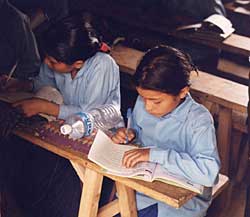 "The government refused to agree to our demands for an interim government, constituent assembly and the establishment of a republic," Burma says, gesticulating vigorously with his forefinger. He plays down Maoist casualties, and plays up the defeat of security forces at Gam, Satbaria and Mangalsen earlier
"The government refused to agree to our demands for an interim government, constituent assembly and the establishment of a republic," Burma says, gesticulating vigorously with his forefinger. He plays down Maoist casualties, and plays up the defeat of security forces at Gam, Satbaria and Mangalsen earlier this year.
Later, Burma grants an impromptu interview to three visiting journalists. "I have nothing to lose, I'll fight to the end. Why shouldn't I?" he asks. Then he launches into a tirade full of Maoist jargon from the 1960s.
We reach Ghartigaun late in the evening to be told that a large Maoist group had just left, heading south. This used to be a bustling township six years ago. Today, most shops are closed, it is impossible to bring in supplies and foodstuffs. The police post at Ghartigaun was moved out four years ago. In November the security forces returned, but stayed for only three months. There used to be a local administration office, a forest range post, a depot of the Food Corporation, an agricultural extension office, and a veterinary clinic. All have been destroyed or abandoned.
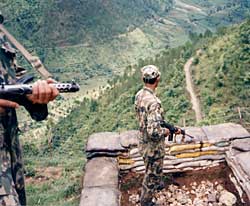 The scars of war are all around: gun-toting young Maoists, burnt down government buildings, landrovers reduced to ashes, households with only children, young widows, and old people. "We are harrassed by both sides. We just listen to whoever is there at the moment," one villager told us with an averted gaze. He looks scared, and whispers about threats, interrogation, beatings by both sides. "You could be arrested on a suspicion, and if you don't have a good explanation once you're taken in, you could be killed."
The scars of war are all around: gun-toting young Maoists, burnt down government buildings, landrovers reduced to ashes, households with only children, young widows, and old people. "We are harrassed by both sides. We just listen to whoever is there at the moment," one villager told us with an averted gaze. He looks scared, and whispers about threats, interrogation, beatings by both sides. "You could be arrested on a suspicion, and if you don't have a good explanation once you're taken in, you could be killed." Ghartigaun has the look of no-man's land. There is no security, no marketplace, no electricity, few drinking water taps. The local school still has some classes, but the two teachers there fled after being threatened by Maoists.
We seek shelter in a house. Our host used to run a tea shop until one day the Maoists came and took him away. He was held captive for six months, handcuffed, blindfolded and beaten almost every day. He has three daughters and two sons, the youngest was born 16 days after the rebels had taken him away.
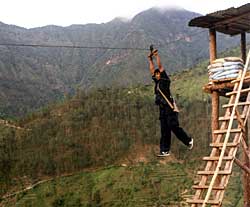 He was finally released after he sold his cattle and all household utensils and paid the Maoists a ransom of Rs 25,000. The family is still paying a Maoist "revolutionary tax" of Rs 50 every month. Other villagers pay the tax in cash or kind. Our host can't afford to pay any more, and is heading off to India to find work the day after our visit.
He was finally released after he sold his cattle and all household utensils and paid the Maoists a ransom of Rs 25,000. The family is still paying a Maoist "revolutionary tax" of Rs 50 every month. Other villagers pay the tax in cash or kind. Our host can't afford to pay any more, and is heading off to India to find work the day after our visit. Another day's walk, and we wait on a house on a hilltop for a promised meeting with a local commander. Comrades Sushil and Ashok arrive, accompanied by the head of the village "people's government", Comrade Prabak. They are soft spoken, and give us the partyline. (See interview.)
Another one, calling himself "Sunil", comes in brandishing a pistol and shotgun cartridges. He is apparently our security detail. Sunil used to work in Kathmandu and had come home for a break a year-and-a-half ago when he was stopped by police, kept in custody and beaten. At 16, he decided to join the Maoists.
The other one, Sushil, chats with us, and tells us about how the police raided his house during Operation Kilo Sierra Two in 1998. He managed to flee, but says they took away his 17-year-old niece and raped her. She joined the Maoists after that. Sushil says there is a company of female Maoists 500 strong. He tells us stories of the action he has seen, including the Maoist defeat at Khara, Rukum. There is an audio tape of the battle, there is sound of heavy gunfire, shouting, and in the distance the thuds of an approaching helicopter.
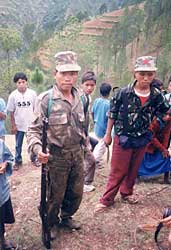 The Armed Police Force training camp on the Nepalgunj highway issues us a curfew pass. Without it, we may have been stopped at a security checkpost, or the Maoists may have suspected that we were army. Armed police tell us of the dangers of a Maoist ambush, and that doesn't lift our confidence level.
The Armed Police Force training camp on the Nepalgunj highway issues us a curfew pass. Without it, we may have been stopped at a security checkpost, or the Maoists may have suspected that we were army. Armed police tell us of the dangers of a Maoist ambush, and that doesn't lift our confidence level. At the Bheri Zonal Hospital in Nepalgunj, Keshab KC has just been brought in. He was attacked the night before and beaten up mercilessly by Maoists using their favourite torture method: crushing knee and ankle bones with rocks. KC's crime is that he is a Nepali Congress supporter. He is conscious, but groaning in agony. His arms are also dislocated. There isn't much they can do for him here, he will be flown to Kathmandu for treatment.
The hospital used to get two patients a day with similar injuries until last year. After the emergency was declared, there are fewer cases but there are still four a week with crushed legs. The victims are nearly always Nepali Congress supporters, or they are teachers who refuse to join the Maoists. Some schools in Rolpa abandoned by teachers have been replaced with Maoist instructors.
After a week walking through the villages of Rolpa, it is clear to us that the people desperately need help. Not to fight the Maoists, but to give the Maoists nothing to fight about. A place to start would be to start rebuilding schools, healthposts, bring back electricity, finish the half-complete road projects.
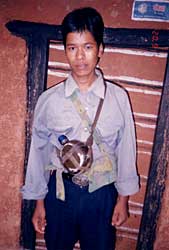 The blockade of food and consumer goods has affected local people badly. Bread, instant noodles, shoes are all contraband items. There is a severe food shortage right across the districts. More than elsewhere, it is in this heartland of the Maoists' revolution that ordinary Nepalis are trapped between the security forces and the rebels. There is extreme fear about what both will do, and there are enough instances of disappearances and torture for the fear to be real.
The blockade of food and consumer goods has affected local people badly. Bread, instant noodles, shoes are all contraband items. There is a severe food shortage right across the districts. More than elsewhere, it is in this heartland of the Maoists' revolution that ordinary Nepalis are trapped between the security forces and the rebels. There is extreme fear about what both will do, and there are enough instances of disappearances and torture for the fear to be real. Out here in the remote hills of Rolpa, peace has never seemed further away. The villagers are fed up of the Maoists, they are fed up of the police and now they are fed up of the war. Four years after Kilo Sierra Two, the methods are still the same.
As I walked out of Rolpa, my mind raced ahead. Who will bring us out of this? The same people who got us here? What will bring an end to this? When will Rolpa stop being a war zone? When will Nepal stop being a battlefield?
The way out of this is not brute force. Peace can only come when there is development, a genuine effort to right past wrongs, and make up for past neglect.
(A longer version of this article will appear in the August issue of the youth magazine Wave, of which Kashish Das Shresta is staff writer.)
Q&A with Ashok
He introduces himself as Comrade Ashok, and answers our questions in a soft voice. But his is a radical and rigid party line. In any other time and any other place, this could have been a chat with a trekking sardar in a roadside tea shop about the condition of the trails.
 Nepali Times: Your party has killed teachers here. Why?
Nepali Times: Your party has killed teachers here. Why? Ashok: Could be. If we killed him, there must be a reason. He could have been a spy, or been responsible for something that benefited the enemy.
Why are you attacking schools?
The demands come from higher places, but our basic idea is to do away with the old and make something new on our own. We are running high schools in areas we control.
Do you believe that people all over Nepal will agree with your philosophy?
They must. It is for them. Our philosophy is that we take from the people who have more, and we give back to the people. We will do exactly that. When the Maoist government has taken place, then there is not much they (the government) can do.
Why didn't Maoism work in China?
I really don't know that. Maybe it's because of the difference of strategy.
How do you communicate between units?
It is strong. If we need to send a message to Ghartigaon from here, anyone is willing to do it for us, even the local villagers. We had already heard you were coming into these areas. Villagers are constantly travelling these routes. If they see new faces they will automatically let us know about it.
Do you have the same kind of organisation in Kathmandu?
There is. They walk around in civil dress. They can't move about as freely, but they go there to do surveys and things like that.


